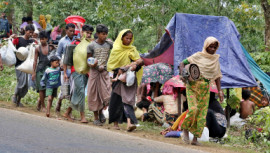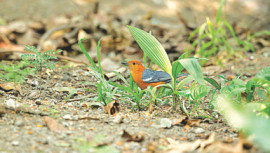The United Nations has reiterated its call for voluntary repatriation of Rohingyas from Bangladesh saying Rohingyas need to feel that the situation is safe enough for them.
“It is up for people to choose to go home. No one should choose for them. Any repatriation of Rohingyas back to Myanmar needs to be voluntary,” said Spokesman for the UN Secretary-General Stephane Dujarric in regular briefing at the UN headquarters.
He said Rohingyas, now living in Bangladesh, need to be able to go to the homes from where they came. “I think they need to feel that the situation is safe enough.”
There have been demonstrations on Friday in camps by Rohingyas protesting plans to repatriate them back to Myanmar.
On the other hand, the Myanmar authorities toured Maungtaw, Rakhine State on Friday and inspected the construction of houses to be used for repatriation of returnees from Bangladesh.
The delegation headed by Rakhine State Chief Minister U Nyi Pu visited the Hla Phoe Khaung, Ngakhuya and Taung Pyo Letwe camps and insisted on completion of the finishing touches on buildings, medical clinics and sanitation infrastructures, according to The Global New Light of Myanmar.
Following the visit to Maungtaw district, the authorities held a meeting in Maungtaw over the work of the Union Enterprise for Humanitarian Assistance, Resettlement and Development in Rakhine State.
A repatriation plan for the members of the Muslim community, who fled Rakhine State to Bangladesh to escape conflict in Myanmar last year, will begin next Tuesday, Myanmar media reports.
Foreign ministry officials in Dhaka said verification and return of Rohingyas will be based on considering the family as a unit and Bangladesh and Myanmar also finalised the “form” for verification.
The modalities for the repatriation of orphans and children born out of unwarranted incidence have been incorporated in the said arrangement.
“The verification form will be distributed among all Rohingya families. The forms will be then handed over to Myanmar authority for scrutiny. Myanmar will send back the forms to Bangladesh after scrutiny,” an official told the news agency indicating that the full-scale repatriation might take some time.
Each Rohingya family member will have to provide a number of information including names, gender, birthplace, name of mother and father, date of birth, address in Myanmar, profession, signs, number of family members and a group family photo.
Under the “Physical Arrangement” Bangladesh will establish five transit camps from where returnees would be received initially in two reception centres on Myanmar side.
Myanmar will shelter the returnees in a temporary accommodation at the Hla Pho Khung and expeditiously rebuild the houses for the returnees to move in there.
Myanmar will consider resettling the people staying at the zero line on a priority basis, according to the agreement.
Meanwhile, a situation briefing teleconference titled, “The Plight of the Rohingya” on the ongoing humanitarian crisis in Myanmar that has displaced the Rohingya Muslim minority will be held on January 25.
The Pacific Council on International Policy, an organisation focused on foreign policy with its headquarters in California, USA, will host the event.
Simon Billenness, executive director, International Campaign for the Rohingya; Priscilla A Clapp, senior advisor, United States Institute for Peace; and Dr Ali Riaz, a professor of the Department of Politics and Government at Illinois State University, will take part in the discussion.
Dr Parveen Parmar, associate professor of Clinical Emergency Medicine, Keck School of Medicine, University of Southern California, will moderate the session.
They will discuss various issues including to what degree does Aung San Suu Kyi's government shoulder blame for this crisis and what should the international community be doing to help the Rohingya.
On January 16, Bangladesh and Myanmar signed a document on “Physical Arrangement” which will facilitate return of Rohingays to their homeland from Bangladesh.
The “Physical Arrangement” stipulates that the repatriation would be completed preferably within two years from the commencement of repatriation.
The World Bank yesterday said the Rohingya crisis in Bangladesh is growing at a rapid pace and there is an urgent need to support the host communities to cope with the influx and to help the refugees who are extremely vulnerable.
After visiting the Rohingya camps in Cox's Bazar area, World Bank South Asia Region Vice President Annette Dixon praised the government of Bangladesh and its people for sheltering and caring for the large influx of Rohingya fleeing violence in Myanmar.
She said the World Bank was ready to work with the government to help the host community and the displaced Rohingya people in Cox's Bazar.
Foreign Minister AH Mahmood Ali on Thursday said the Rohingya problem can be solved permanently with sustainable return of Rohingyas to Myanmar.





























